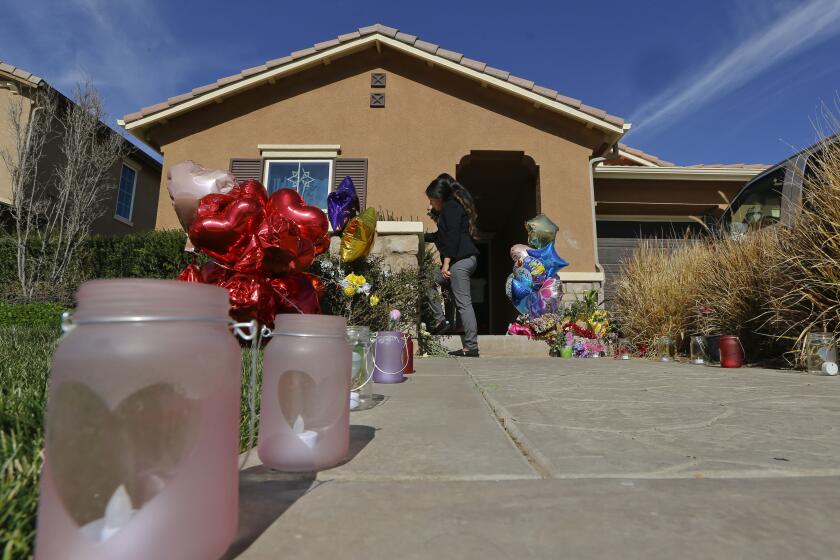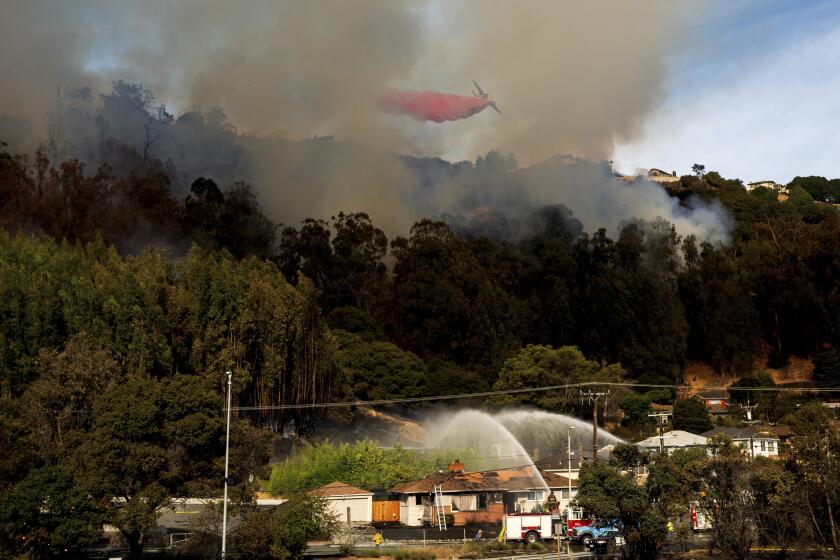Gaining Spiritual Strength : Dawn-to-Dusk Fast a Way of Life During Muslim Holy Month
Every day this month, 7-year-old Mehwish Sheikh has been rising with her family at 4 a.m. to eat breakfast, then going back to sleep for a few hours before school. The meal is her last one for nearly 14 hours, when she breaks her fast.
Mehwish joins about 30,000 other Muslims across Orange County who are fasting and worshiping in observation of the holy month of Ramadan, the most widely celebrated holiday in Islamic religion.
“Fasting is a special thing to do. I get hungry, but I don’t mind. We eat a lot in the morning so we don’t get as hungry during the day,” Mehwish said.
According to Islamic religion, Ramadan is the month when God revealed the Koran, Islam’s holy book, to the prophet Mohammed.
Ramadan is observed during the ninth month of the lunar year, beginning with the sighting of a new moon. This year the holiday began on Feb. 1 and is expected to end March 2.
Muslims fast “for self-discipline, to give thanks to God for his gift of giving, and for charity, to help the poor and needy,” said Muzzamil Siddiqi, religious director of the Islamic Society of Orange County.
Muslims must fast from dawn until dusk. During the fasting hours, they must abstain from food, drink and smoking. At 5:30 p.m., they break the fast with dates, fresh fruits, appetizers, beverages and dinner.
At the Islamic Society in Garden Grove, a free meal is offered every night during the month of Ramadan. Community members donate the food. About 1,500 also attend a community fast-breaking meal, called Iftar, on Saturdays.
Although the first and second days of fasting “are a little difficult, we get used to it. We (usually) take a lot of food we really don’t need. Sometimes it is just habit. We can do with much less food than we normally take,” Siddiqi said.
Tamara Zeydan, 24, of Huntington Beach, said that for her, fasting also improved her health. “It rejuvenates the body and clears the mind, both physically and spiritually, “ she said.
Children younger than 8 years old are not required to fast, though some choose to fast for a few days. At the age of 12 or 13, fasting becomes mandatory. The elderly, infirm, pregnant women or those who are traveling are also not required to fast.
“I want to fast. It’s important because I can feel how the poor people feel when they don’t have any food,” said Mohammad Moumne, 11, a student at the Islamic Society’s Orange Crescent School, the only Muslim school in the county. “And I remember God for giving me food.”
Ramadan is also a month devoted to prayers and thanksgiving. In addition to the regular prayers that take place five times daily, passages are read from the Koran at a special evening prayer, called Tarawih, at 7:45 p.m.
At a prayer session this week, about 200 schoolchildren and adults removed their shoes to enter the mosque at the Islamic Society. Many of the men wore white woven caps. The women, who in conformance with Islamic law are seated at the back of the mosque, wore scarves covering their heads, and ankle-length dresses. Schoolgirls wore blue dresses with pants underneath.
While the hushed crowd touched their heads to the floor, rose to their feet and bowed their heads repeatedly, a prayer leader chanted, “God is great. Glory be to God. All prayers belong to God.”
Many said they were praying to show their gratitude for their health and prosperity. “I am thankful for the life, the things which we have here, the privilege and opportunities our children and families have,” said Syed Hasan, 64, of Huntington Beach. “I am thankful for the opportunity to worship and pray the way we as religious people would like to do.”
But even while Muslims in Orange County are giving thanks, they are also praying for their relatives in Chechnya, Bosnia and Kashmir.
“As Muslim people, we understand that Islam the nation is one, no matter where we are,” Hasan said. “We feel the same kind of pain and suffering as they do there.”
On March 3, a special feast called Eid ul-Fitr will signal the end of Ramadan and the breaking of the fast. During the three-day celebration, Muslims exchange gifts--toys for the children, clothing and money for the adults--and send greeting cards and visit with relatives.
More to Read
Sign up for Essential California
The most important California stories and recommendations in your inbox every morning.
You may occasionally receive promotional content from the Los Angeles Times.










